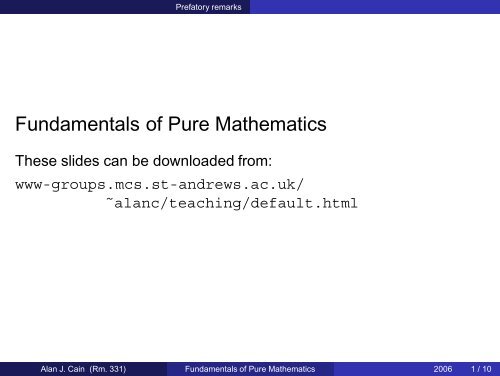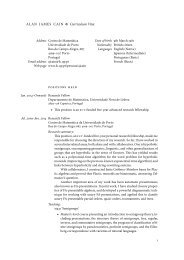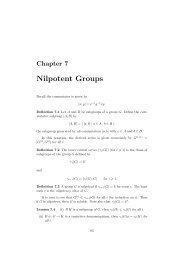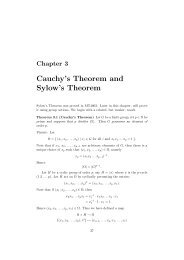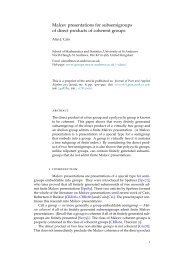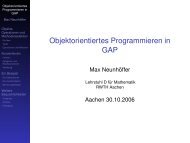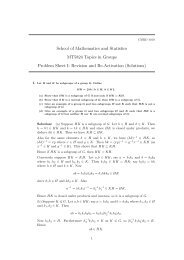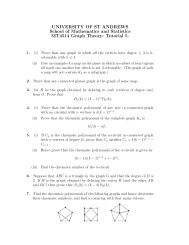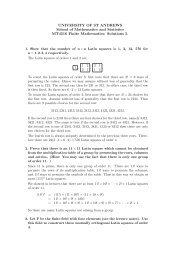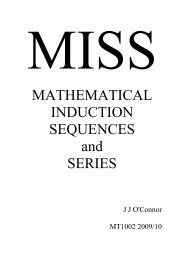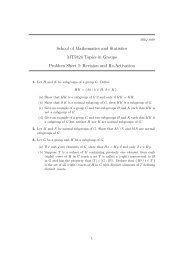Fundamentals of Pure Mathematics
Fundamentals of Pure Mathematics
Fundamentals of Pure Mathematics
You also want an ePaper? Increase the reach of your titles
YUMPU automatically turns print PDFs into web optimized ePapers that Google loves.
Prefatory remarks<br />
<strong>Fundamentals</strong> <strong>of</strong> <strong>Pure</strong> <strong>Mathematics</strong><br />
These slides can be downloaded from:<br />
www-groups.mcs.st-andrews.ac.uk/<br />
˜alanc/teaching/default.html<br />
Alan J. Cain (Rm. 331) <strong>Fundamentals</strong> <strong>of</strong> <strong>Pure</strong> <strong>Mathematics</strong> 2006 1 / 10
P(N)<br />
More cardinality and countability<br />
Theorem 24.1<br />
|(0, 1)| = |P(N)|. (So P(N) is uncountable.)<br />
Pro<strong>of</strong>.<br />
Define f : (0, 1) → P(N) by<br />
0.a 1 a 2 a 3 ... ↦→ {i : a<br />
} {{ }<br />
i = 1},<br />
binary expansion<br />
where a j ∈ {0, 1}.<br />
f is an injection, so |(0, 1)| ≤ |P(N)|.<br />
Alan J. Cain (Rm. 331) <strong>Fundamentals</strong> <strong>of</strong> <strong>Pure</strong> <strong>Mathematics</strong> 2006 2 / 10
P(N)<br />
More cardinality and countability<br />
Pro<strong>of</strong> (cont.)<br />
Define g : P(N) → (0, 1) as follows,<br />
g(X) = 0.a 1 0a 2 0a 3 ...<br />
} {{ }<br />
binary expansion<br />
(i ∈ X =⇒ a i = 1, i /∈ X =⇒ a i = 0).<br />
g is an injection.<br />
So, by the Schröder–Bernstein theorem, |(0, 1)| = |P(N)|.<br />
Why not g(X) = 0.a 1 a 2 a 3 ... Because then<br />
g({1}) = 0.1000 ... = 0.0111 ... = g(N − {1}).<br />
(cf. 0.1000 ... = 0.0999 ... for decimal expansions.)<br />
Alan J. Cain (Rm. 331) <strong>Fundamentals</strong> <strong>of</strong> <strong>Pure</strong> <strong>Mathematics</strong> 2006 3 / 10
More cardinality and countability<br />
More countable sets<br />
Proposition 24.2<br />
Let P be the set <strong>of</strong> all subsets <strong>of</strong> N <strong>of</strong> size 2. Then P is countable.<br />
Pro<strong>of</strong>.<br />
Clearly |P| ≤ |N × N| = |N|. Since N has the smallest cardinality <strong>of</strong> any<br />
infinite set, |P| = |N|.<br />
Alan J. Cain (Rm. 331) <strong>Fundamentals</strong> <strong>of</strong> <strong>Pure</strong> <strong>Mathematics</strong> 2006 4 / 10
More cardinality and countability<br />
More countable sets<br />
Proposition 24.3<br />
Let P n be the set <strong>of</strong> all subsets <strong>of</strong> N <strong>of</strong> size n. For any n ∈ N, P n is<br />
countable.<br />
Pro<strong>of</strong>.<br />
Clearly |P n | ≤ |P n−1 × N|. By induction, P n−1 is countable. So<br />
|P n | ≤ |N × N| = |N|. So |P| = |N|.<br />
Alan J. Cain (Rm. 331) <strong>Fundamentals</strong> <strong>of</strong> <strong>Pure</strong> <strong>Mathematics</strong> 2006 5 / 10
More cardinality and countability<br />
Finitary power set<br />
Recall that PX, the power set <strong>of</strong> X, is defined by<br />
PX = {Y : Y ⊆ X}.<br />
The finitary power set <strong>of</strong> X, denoted P F X, is the set whose members<br />
are finite subsets <strong>of</strong> X<br />
P F X = {Y : Y ⊆ X, Y is finite}<br />
Notice that<br />
P F N = {∅} ∪ ⋃ n∈N<br />
P n .<br />
Alan J. Cain (Rm. 331) <strong>Fundamentals</strong> <strong>of</strong> <strong>Pure</strong> <strong>Mathematics</strong> 2006 6 / 10
More cardinality and countability<br />
Finitary power sets<br />
Proposition 24.4<br />
P F (N) is countable.<br />
Alan J. Cain (Rm. 331) <strong>Fundamentals</strong> <strong>of</strong> <strong>Pure</strong> <strong>Mathematics</strong> 2006 7 / 10
More cardinality and countability<br />
Countable unions <strong>of</strong> countable sets<br />
Theorem 24.5<br />
If S i is countable for each i ∈ N, then<br />
S = ⋃ i∈N<br />
S i<br />
is countable.<br />
Pro<strong>of</strong>.<br />
Let f i : S i → N be a bijection. Define f : S → N × N by<br />
x ↦→ (i, f i (x))<br />
where x ∈ S i but not in S 1 ∪ · · · ∪ S i−1 .<br />
This map is an injection, so |S| ≤ |N × N| = |N|. So |S| = |N|.<br />
Alan J. Cain (Rm. 331) <strong>Fundamentals</strong> <strong>of</strong> <strong>Pure</strong> <strong>Mathematics</strong> 2006 8 / 10
More cardinality and countability<br />
Finitary power sets<br />
Pro<strong>of</strong> <strong>of</strong> Proposition 24.7.<br />
P F (N) is the union <strong>of</strong> the various countable sets P n and the 1-element<br />
set {∅}, so is itself countable.<br />
Alan J. Cain (Rm. 331) <strong>Fundamentals</strong> <strong>of</strong> <strong>Pure</strong> <strong>Mathematics</strong> 2006 9 / 10
Fin<br />
More cardinality and countability<br />
This is the end <strong>of</strong> the course, but we have a few matters to clear up:<br />
Surprise Egg Competition winners<br />
Feedback survey<br />
Next week — revision lectures on Monday and Tuesday (Jan 2007<br />
paper)<br />
Next week — tutorial & examples class<br />
Alan J. Cain (Rm. 331) <strong>Fundamentals</strong> <strong>of</strong> <strong>Pure</strong> <strong>Mathematics</strong> 2006 10 / 10


